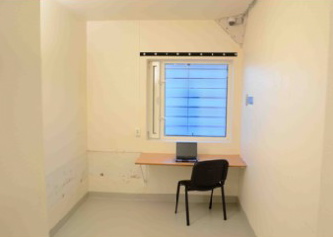Convicted Norwegian terrorist Anders Behring Breivik wants to petition the courts to have his ongoing isolation deemed unlawful, after 33 months in solitary confinement, reports newspaper Aftenposten. Lawyers for the man who killed 77 people in his July 22, 2011 attacks, along with some other legal experts, argue the isolation is an additional penalty on top of the sentence Breivik is serving, and is not allowing him to rehabilitate.

The Norwegian correctional system, Aftenposten noted, runs on the fundamental principal that imprisonment is a loss of freedom, not a loss of other human rights. Aftenposten reported that there is a broad consensus among criminal law experts and the state’s correctional services management itself that ongoing isolation can cause physical and psychological damage, yet there are no restrictions on how long a prisoner can be kept in isolation.
The average time an inmate spends at the infrequently used “especially high security” level is between 12 to 18 months. Breivik, whose attacks claimed eight lives in his bombing of government headquarters in Oslo and 69 in his massacre on the island of Utøya, occupies specially sectioned-off rooms in the prison and is not allowed contact with other inmates. The 35-year-old’s only visitors have been lawyers, health or pastoral care workers, and his now deceased mother. He has a TV, gaming console and typewriter, but no computer. Breivik’s lawyer Tord Jordet said his client is also subjected to daily bodily inspection.
“When a court imposes a prison sentence, it’s the detention itself that constitutes the punishment, and Correctional Services shall not impose further punishment through stronger prison conditions than necessary,” Jordet told Aftenposten. “Breivik is isolated from contact with other staff and is largely denied correspondence with people outside the prison. When this is exclusively justified under the conditions he is already sentenced for, it constitutes an illegal additional penalty, and is a clear human rights violation.”
“The penalties shall be conducted in a way which protects the community, inmates and staff,” said Marianne Vollan, head of the the Directorate of Norwegian Correctional Service (Kriminalomsorgsdirektoratet). “There are security reasons justifying some inmates’ zoning at the especially high security level. Such placement is reviewed regularly, and should only be maintained while it is necessary for safety.”
Last January Breivik reported several people for violation of the criminal laws that prevent public service personnel from doing another person physical or psychological damage with the intent of punishment. He claimed his prison conditions worsened after he made the reports, and the hatred against him was so strong that the rule of law had been overridden. His case was dismissed by Norway’s Supreme Court in February this year.
Experts divided
Lawyer John Christian Elden, who assisted in the July 22 case, said isolation under detention was considered torture under international law and should only be used where absolutely necessary. “To justify isolation on the protection of Breivik himself, even where he doesn’t want it, is at best doubtful,” said Elden.
High-profile lawyer Harald Stabell said while Breivik’s case is unique, because of the gravity of his crimes, it doesn’t justify the isolation regime. “There must be other ways to reduce the risk of escape, while maintaining his own safety,” Stabell argued. Professor Kristian Andenæs from Oslo University’s Criminology and Sociology department said 33 months in isolation was “extreme,” and can’t be justified under Norwegian or international law.
Professor Erling Johannes Husabø at Bergen University said it’s questionable whether the total isolation is right. But he said crucial to whether the ongoing isolation was an illegal additional penalty was the grounds for the isolation. “If a prisoner, for example, is particularly dangerous for their inmates, it can not be regarded as a punishment to keep him isolated from the others for a time,” he said. “But if the justification lies with the crime he has done, there is an additional penalty that the law does not allow.”
However, Professor Kjetil Mujezinoviã Larsen at the Norwegian human rights centre said the conditions imposed on Breivik are within the acceptable limits under Article Three of the European Convention on Human Rights, which bans torture and inhuman or degrading treatment. “The European Court of Human Rights has been willing to accept long isolation under prison conditions that presumably correspond to those Behring Breivik is under, in cases against people who have committed similar acts,” he said.
Working towards rehabilitation
Another fundamental tenet of the Norwegian corrections system is that prisoners should be rehabilitated and returned to society. Breivik’s first opportunity to have his sentence reconsidered will be in July 2021. “The regulations don’t provide for anyone to be exempt from this notion,” said Vollan. “Nevertheless it is so that implementation of detention shall safeguard society’s need for security against new, serious criminality from the detainee’s side. Ensuring safety, the detainee is given the opportunity to change his or her behaviour.”
Jordet does not believe there’s any will within Corrective Services to allow Breivik the opportunity to change. “I see no plans or thoughts over rehabilitating him,” he told Aftenposten. “Through a written request I asked to see his rehabilitation plan, and got the answer that no such plan has been prepared. As soon as a judgment has been made, Corrective Services should start targeted rehabilitation work so the inmate can return to society. For many it seems so unthinkable for Breivik to be released that it looks like Corrective Services neither wants or has the capabilities to facilitate a return to society.”
newsinenglish.no/Emily Woodgate

